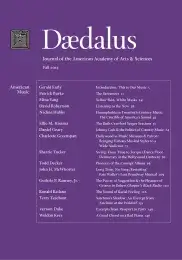Johnny Cash & the Politics of Country Music
Johnny Cash’s live prison albums, “At Folsom Prison” and “At San Quentin,” are significant and under-recognized social statements of the 1960s. Cash encouraged his listeners to empathize with prisoners by performing songs with prison themes and by recording the electric reactions of inmates to his music. Cash performed before a multiracial audience, and his music was popular with the counterculture as well as with traditional country fans. Cash's albums and his prison reform activism rejected the law-and-order policies of conservative politicians who sought to enlist country music in their cause. An examination of Cash’s prison records challenges the commonly held notion that country music provided the soundtrack for the white conservative backlash of the late 1960s.
We don’t smoke marijuana in Muskogee
We don’t take our trips on LSD
We don’t burn our draft cards down on Main Street
We like livin’ right and bein’ free.
–Merle Haggard, “Okie from Muskogee”
Country musician Merle Haggard’s 1969 hit “Okie from Muskogee” became an anthem of conservative backlash. The song contrasted the traditional values of the American heartland with psychedelic drug use, anti-Vietnam War protests, sexual liberation, hippie fashion, and campus unrest. Songs about “Okies,” whites who had migrated to California from Oklahoma and nearby states during the Dust Bowl, had once been associated with left-wing folk singers such as Woody Guthrie. But when Haggard sang, “I’m proud to be an Okie from Muskogee,” he tied pride in white working-class identity to conservative attacks on the counterculture and the New Left in a way that resonated with the political messages of George Wallace, Ronald Reagan, and Richard Nixon. In live performances, Haggard’s enthusiastic audiences waved American flags.1
Politicians and critics at the time viewed country as the musical language of a white working class that was once a solid contingent of the New Deal Democratic coalition, but that defected in large numbers to the Republican Party beginning in the 1960s. However, while many New Right politicians sought to capitalize on the popularity of country music, the genre was not inherently conservative. The most popular country records of the late 1960s challenged backlash politics. Johnny Cash’s classic live prison recordings, At Folsom Prison (1968) and At San Quentin (1969), rejected conservative calls for “law and order.” . . .
